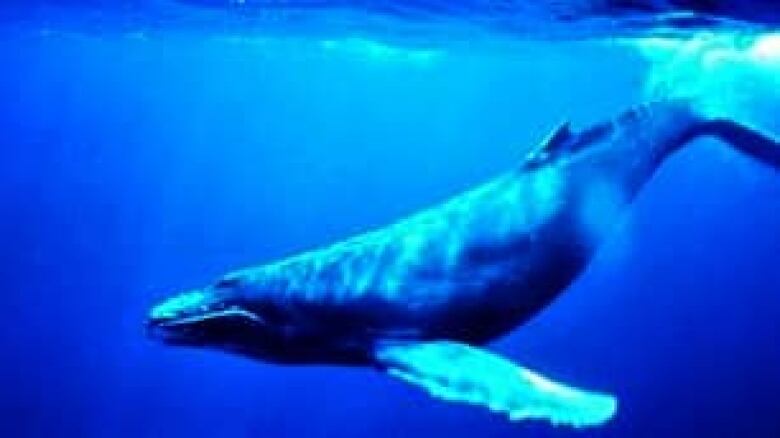Humpback whales make West Coast comeback

A threatened species of whale that was nearly hunted to extinction seems to be making a comeback off Canada's West Coast, according to observers.
The North Pacific population of humpback whales has doubled in the past two decades, hitting close to 20,000 in the North Pacific, an international study released last year concluded, and local whale watchers say they can vouch for the results.
Stubbs Island naturalist Jackie Hildering has seen the recovery of humpbacks first-hand while working in the Broughton Archipelago off the northeast coast of Vancouver Island.
Hildering said while sightings of the threatened whale used to be rare, this year she's identified almost 50 individual whales including juveniles.
"It's been this amazing gift to see them come back," she said.
Endangered no more?
Jay Barlow, a scientist with the National Oceanic and Atmospheric Administration (NOAA) in La Jolla, Calif., said "the bottom line is really good news."
But while the whales have avoided being hunted to extinction, they may now face some modern-day threats to their survival, including climate change, which could affect the waters where they feed and breed, said Barlow.
"If their habitat changes, are they going to be flexible enough to deal with that? …We don't know at this point," said Barlow. "The same places where whales have been going to in the past, that have been good for feeding in the past, may not be good places for the future."

Hildering worries that could affect the research funding to study the whales and create management plans.
"When there's fundamental questions like, how do humpbacks find their food, how do they find Hawaii — we don't even know where all of them go in the winter — when there's such fundamental gaps of knowledge, for even an animal this big, I do have concerns about there being less management of them," said Hildering.
The U.S. review is expected to be complete next year.
Hunting ban challenged
Humpback whales have been protected by the International Whaling Commission since 1965 in the North Pacific and 1955 in the North Atlantic, according to Fisheries and Oceans Canada.
But Japan dispatched its whaling fleet in 2007 to the southern Pacific in the first major hunt of humpback whales since the 1960s, but the hunt generated widespread criticism and was eventually called off at the request of the U.S.
Despite the hunting bans, the Canadian government says humpbacks are still at risk because of over-fishing of their prey — including tiny crustaceans and small fish. The whales also can become entangled in the fishing nets of commercial trawlers and drown.
And while the numbers are now growing steadily, the population is still just one-fifth of the pre-whaling size, according to the Department of Fisheries and Oceans.